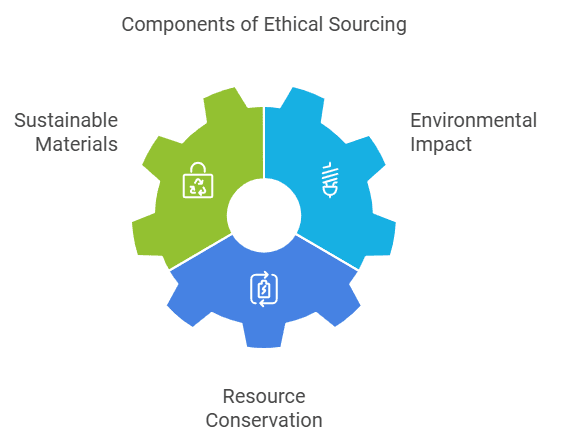Contact: +91 99725 24322 |
Menu
Menu
Quick summary: Discover how ethical supply chain practices drive trust, sustainability, and impact. Learn key challenges and solutions, including traceability platforms.

Consumers, businesses, and governments alike are calling for greater accountability and transparency in how products are sourced, manufactured, and delivered. As a result, companies are realizing that embedding ethical practices in their supply chains is not just about doing good—it’s about doing well for both their bottom line and society at large. Ethical practices in supply chain management are no longer just a nice-to-have – they are a must-have.
PwC’s 2024 Consumer Survey reveals that 79% of consumers worldwide favor brands that engage in ethical sourcing, while 9.7% are prepared to pay extra for products made ethically.
In this blog post, we’ll explore what ethical supply chain management is, why it’s crucial, and how businesses can implement these practices to achieve sustainability, improve consumer trust, and mitigate risks. Whether you’re a small business owner or part of a large corporation, embracing ethical practices in your supply chain can drive positive change, reduce operational risks, and create lasting value.
Key Takeaways
At its core, ethical supply chain management refers to the practice of ensuring that the production, sourcing, and distribution of products are done in a way that respects both human rights and environmental standards. This encompasses everything from labor rights and fair wages to environmental stewardship and sustainable sourcing.
In an ethical supply chain, companies hold their suppliers and partners accountable for following ethical practices, which may include:
Ethical supply chains go beyond compliance with laws—they are about building relationships based on trust, respect, and shared values. A business that practices ethical supply chain management demonstrates its commitment to social responsibility and sustainability.
Incorporating ethical practices into your supply chain offers numerous benefits, both immediate and long-term.
Today’s consumers are more informed and conscious than ever before. They want to support businesses that align with their values—particularly when it comes to environmental impact, social justice, and fair treatment of workers. By operating an ethical supply chain, your company can earn the trust and loyalty of consumers who care about where their products come from and the impact they have on the world.
A lack of transparency and unethical practices in the supply chain can lead to significant risks, including legal issues, reputational damage, and financial penalties. Implementing ethical practices helps mitigate these risks by ensuring compliance with local and international labor laws, environmental regulations, and trade agreements.
Ethical practices in supply chain management can give your business a competitive edge. As consumers increasingly demand products with an ethical and sustainable background, businesses that invest in ethical sourcing and production processes can differentiate themselves in the market. A transparent supply chain can help you stand out and attract customers who are willing to pay a premium for ethical products.
While ethical practices in supply chains might seem costly at first, they can lead to long-term savings. For instance, sustainable sourcing and resource management can reduce waste, improve efficiency, and lower costs. Additionally, establishing ethical relationships with suppliers can create a more reliable and resilient supply chain, reducing the likelihood of disruptions.
Sustainability is a core component of ethical supply chain management. By sourcing responsibly, reducing emissions, and supporting sustainable practices throughout the supply chain, businesses can contribute to global sustainability goals such as the UN’s Sustainable Development Goals (SDGs). Businesses that prioritize ethical practices can help tackle global challenges such as climate change, poverty, and inequality.

Building an ethical supply chain involves focusing on several key components. Here are some essential factors to consider when developing an ethical supply chain strategy:
Fair trade practices are at the heart of ethical supply chains. Ensuring that workers are paid fairly, work in safe conditions, and are treated with dignity and respect is crucial. This includes eliminating child labor, forced labor, and human trafficking from your supply chain, and ensuring that your suppliers uphold these standards as well.
Businesses can promote fair labor practices by conducting regular audits of their suppliers, requiring certifications like Fair Trade or SA8000, and engaging with third-party organizations that specialize in labor rights.
Sustainable sourcing means acquiring materials and products from suppliers who adhere to sustainable environmental practices. This includes using renewable resources, minimizing waste, and reducing carbon emissions. Sourcing sustainably also means ensuring that natural resources are not depleted faster than they can be replenished.
To implement sustainable sourcing, businesses can work with suppliers who meet sustainability certifications, such as Rainforest Alliance or Forest Stewardship Council (FSC). Companies can also opt for materials that have a lower environmental footprint, such as recycled or biodegradable materials.
The Union for Ethical BioTrade (UEBT) plays a pivotal role in sustainable sourcing by ensuring biodiversity conservation, fair trade, and ethical practices across supply chains. UEBT sets standards and offers certification for companies committed to sourcing natural ingredients ethically, fostering respect for biodiversity, and ensuring fair working conditions. By adhering to UEBT principles, companies enhance transparency and accountability, driving sustainable growth and meeting consumer demand for ethically produced products.
Transparency and traceability go hand-in-hand. Consumers and stakeholders demand to know where products come from, how they are made, and what impact they have on people and the planet. Blockchain technology, QR codes, and supply chain mapping are increasingly used to ensure that products can be traced from source to shelf.
Transparency allows businesses to verify that their suppliers are adhering to ethical practices, while supply chain traceability helps track environmental impacts, labor conditions, and product quality.
A US-based bio nutraceutical company, with European headquarters in France, collaborated with TraceX to overcome complex agricultural, economic, and social challenges in sourcing roses from Turkey. By using TraceX’s traceability solutions, the company achieved production monitoring improvements, enhanced socio-economic transparency, and promoted sustainable practices in the rose cultivation sector, addressing key issues contributing to the industry’s decline in Turkey. This case highlights how technology-driven traceability fosters resilience, sustainability, and equitable sourcing in agricultural supply chains.
Ethical supply chains are committed to reducing environmental impact. This can involve sustainable farming practices, energy-efficient manufacturing processes, and waste reduction efforts. By ensuring that the environmental footprint of each product is minimized, companies can contribute to global efforts to tackle climate change and preserve natural resources.
CPG Businesses can start by reducing waste and emissions in their own operations and working with suppliers who are committed to reducing their environmental impact. Utilizing energy-efficient technologies and adopting circular economy principles can also help mitigate environmental harm.
Working closely with suppliers is essential for building an ethical supply chain. Regular audits, assessments, and collaboration help ensure that suppliers are meeting ethical standards and regulations. This also allows businesses to identify any issues early on and work together to address them.
Supplier collaboration also means providing training and support for suppliers to help them meet ethical standards and improve their practices. Many businesses partner with organizations that specialize in supplier assessments and audits, ensuring that the entire supply chain is held to high standards.
1. Conduct a Supply Chain Audit
The first step in implementing ethical practices is to conduct a thorough audit of your current supply chain. Identify potential areas of risk, such as suppliers who may not adhere to fair labor practices or sources of raw materials that are not sustainable. Audits help businesses identify gaps and set a baseline for improvement.
2. Set Clear Standards and Expectations
Establish clear ethical standards for your suppliers. These should include environmental policies, labor conditions, and product sourcing practices. Communicate these expectations clearly and regularly to your suppliers and make it known that adherence to these standards is non-negotiable.
3. Leverage Technology for Transparency
Use technology to increase transparency and traceability in your supply chain. Blockchain, for example, can provide a secure and immutable record of every transaction, from raw material sourcing to product delivery. QR codes on products can provide customers with detailed information about a product’s journey, ensuring that your supply chain is transparent from start to finish.
4. Engage with Third-Party Auditors
Third-party auditors can verify that your suppliers are meeting ethical standards. Independent audits ensure that your supply chain practices are genuine and provide an objective assessment of potential risks. Certification bodies like Fair Trade, SA8000, and ISO 14001 offer assurance that your supply chain meets specific ethical and environmental standards.
5. Encourage Collaboration with Suppliers
Collaborating with suppliers is crucial for building an ethical supply chain. Work together to improve labor conditions, reduce environmental impact, and find ways to make the supply chain more efficient and sustainable. Building long-term relationships based on trust and mutual respect can help ensure that ethical practices are upheld at every level.
The TraceX blockchain traceability platform addresses challenges in ethical supply chains by:
1. Digitization of Data: It streamlines data collection and storage, reducing manual errors and ensuring consistent, reliable inputs from all supply chain stages.
2. Data Aggregation: Aggregates data across multiple sources for a comprehensive, unified view of supply chains, simplifying decision-making.
3. Enhanced Transparency: Offers end-to-end visibility, enabling traceability from source to consumer.
4. Immutable Records: Blockchain’s secure, tamper-proof system supports regulatory compliance and ethical verification.
5. Multi-Tier Supplier Management: Provides traceability across all tiers to reduce unethical practices.
6. Real-Time Monitoring: Supports proactive compliance and issue mitigation.
Implementing ethical practices in supply chain management is essential for fostering trust, promoting sustainability, and meeting the growing demand for social responsibility. By leveraging traceability platforms, engaging with stakeholders, and focusing on transparent, data-driven solutions, businesses can transform their supply chains into powerful drivers for positive change. The journey toward a more ethical, resilient supply chain benefits not only the planet but also every person and business involved.
Ethical supply chains can improve brand reputation, reduce risks, increase consumer trust, and drive sustainability efforts, all of which contribute to long-term profitability.
Challenges can include resistance to change from suppliers, lack of transparency, and the high cost of auditing and certification. However, the benefits often outweigh these initial hurdles.
Conduct regular audits, require certifications, use traceability technology, and foster open communication with suppliers to ensure they meet your ethical standards.
